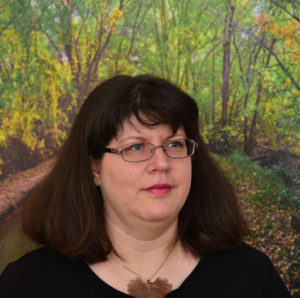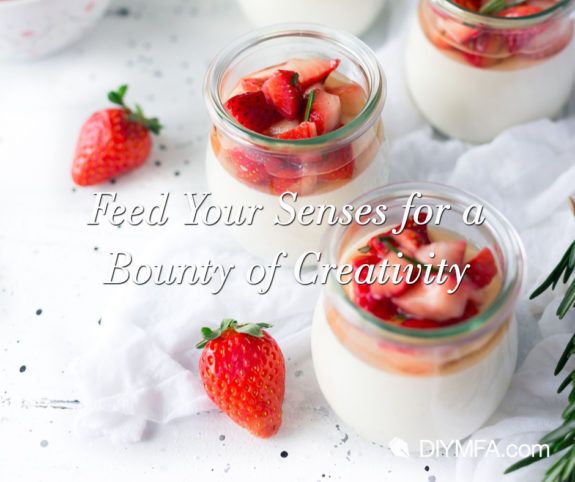In this time of Zoom, many creators have found it difficult to compose anything. Authors have said the lack of external stimulation has made it difficult to engage with the creative process. Writers find inspiration from the world around them, whether it’s a snippet of overhead conversation, a waft of a particular scent that brings back a memory, or a song that transports the mind.
Adding to this is the overdevelopment of one sense: sight. Hours of staring at a screen is nothing new for writers, but now we spend additional hours staring at the screen during Zoom calls and webinars. Absorbing that much blue light isn’t good for the human body. And focusing on just one thing a short distance away for long periods of time isn’t kind to the eyes.
At a writing workshop with Jane Cleland we were asked to describe a scene using senses other than sight. She narrated walking into a room and smelling something bad: “I went to go see what the smell was.” She had us think about that for a moment. Why do we go “see” a smell? My cat investigates with his nose first. But present-day humans are wired to use sight as our dominant sense.
Any time you engage only one sense the others get muted. Awakening other senses creates new pathways, stimulates other areas of your brain, and gets the creative juices flowing again.
Engage other senses to awaken other parts of your brain for expanded creativity
Taste
At college I spent break time with culinary school students, many of whom were heavy smokers. I asked one student how he could taste what he was cooking since smoke dulls the sense of taste. He said he stuffed fresh herbs in his mouth once a week to remind his taste buds of that flavor.
Reawaken your sense of taste. Try something new, or go for something spicy. I have been craving curry, stir-fry, and anything Mexican more than ever. Focus on the flavors and what feelings or memories they evoke. For an added layer of creativity, sample dishes from the setting of your book.
Smell
In a nature writing class my assignment was to write on my connection to water. This topic is my heart and soul, and a magical trip to Banff, Canada a cherished memory. It should have been easy to write about my trip there. But I couldn’t reach it.
Author and writing instructor Kathryn Aalto uses perfume when she writes, so I borrowed a page from her book. I spritzed my wrists with a fragrance that evoked the memory of this trip, and voilà! I was back at the mineral pools, feeling again the snow crunching under my bare feet. Line by line I was able to write this essay.
Revitalize your sense of smell. Experiment with aromatherapy to evoke different moods. Energizing scents include sweet orange and peppermint. To rejuvenate your space try lemongrass, lemon, or rosemary. If you seek relaxation use lavender, or sandalwood to feel centered. You can also play with fragrances to match the seasons.
Sound
To this day when I hear the opening notes of Champagne Supernova I am back in college in early spring at the sandwich shop on the edge of campus where I first heard the opening guitar riff. I vaguely recall the walls were yellow, but it’s the song that brings back this sense of place.
Experiment with soundscapes or music in a genre slightly out of your usual playlist. I’ve gotten out of a music rut by listening to the musicians who have influenced my favorite band or solo musician. It’s familiar and yet extends my boundaries too.
Touch
During the pandemic I found my fingers clutching the soft blanket on the chair like a wooby while watching movies. It took me a while to realize I needed to feel that soft texture. My sense of touch had been dulled by the overuse of sight.
Get your hands messy. Invest in finger paints. Dig in a garden. Anytime you get your hands in the dirt, it literally grounds you. Go for the trifecta and plant a small window box herb garden. You can smell the herbs growing (to get the most scent, rub a leaf between your fingers), get your hands in the dirt, and taste the fresh herbs in your cooking.
Combine elements to create a rich sensory network for inspiration
At the beach, squish the sand between your toes, hear the waves hiss on the shore, and smell the tang of sea salt air. Pick up a seashell, feel its spines and ridges, and hold it up to your ear to hear whispers from the ocean.
Go for a walk and engage the other four senses. Pause for a moment to close your eyes and smell what is around you. Find a pine cone and bring it back to your writing space to engage with something new.
In the city, find a favorite tree in the park. Sit underneath the tree and close your eyes, inhale the scent of bark, and listen to the bird song around you. Place your hands on the bark and feel the texture under your fingers. Lie down on the ground and feel your shoulders relax into the dirt or grass.
Experiment and see what works for you. Amplify one sense in your writing life for a week, then layer another sense the following week. Feed your other four senses and enjoy the bounty of creativity.

Ambre Dawn Leffler is a Tai Chi instructor, gardener, and weather geek who writes about vegetables, seasons, communing with nature, and the interconnections of mind/body. She loves trees and cherishes time in their presence. Learn more about her tree time, garden residents, and wellness practices at her website ambredawnleffler.com and seasonal inspiration from her newsletter https://ambredawn.ck.page/newsletter-page.







